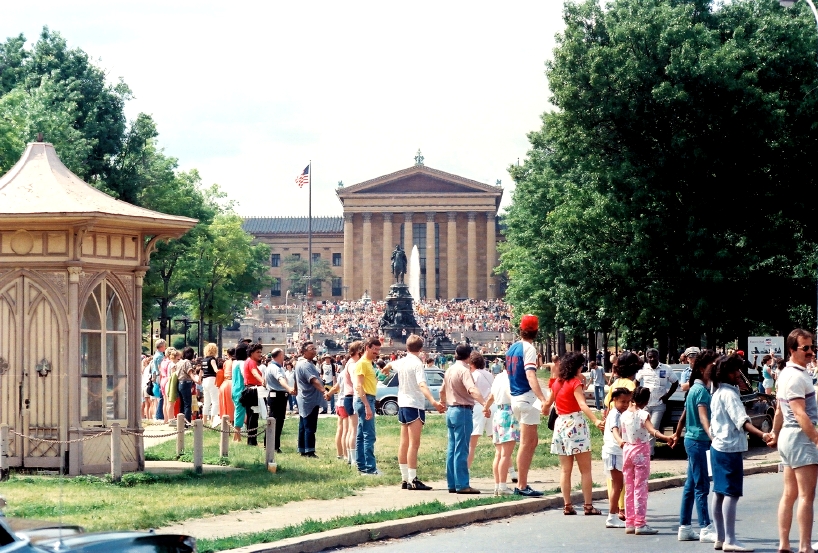1986: Incoming Students’ Civic Engagement Amidst Hands Across America and the Chernobyl Disaster

January 1986 kicked off with the legendary 1985 Chicago Bears beating the New England Patriots 46-10 in Super Bowl XX. The Statue of Liberty celebrated its centennial. The European Economic Community, later to be known as the European Union, got a little bigger with the addition of Spain and Portugal. Tragedy struck the U.S. with the explosion of the Space Shuttle Challenger a mere seventy-three seconds after launching. The country mourned all seven crew members including Christa McAuliffe, a high school teacher who won a contest to become the first American civilian to travel into space.
This year was also one of major advances in technology. IBM introduced mobile computing when they released the first laptop; Microsoft went public selling their shares on the stock market making thousands of millionaires; and Eric Thomas created LISTSERV automating and making mass emails easier than ever. In entertainment news, Top Gun rocked the box office becoming the highest grossing film of the year, and its accompanying soundtrack settled in at number one on the Billboard Hot 200 albums for five consecutive weeks; the Oprah Winfrey Show was broadcast nationally for the first time; and Phantom of the Opera debuted in London at Her Majesty’s Theatre.
Multiple cover-ups of environmental disasters were attempted. The Soviets tried to conceal the disastrous meltdown at the Chernobyl power plant in the Ukraine (then part of the Soviet Union), but when more than fifty tons of radioactive material were released into the atmosphere, several times that of an atomic bomb, Swedish monitoring stations detected the increased radiation almost a thousand miles away. Five thousand people were estimated to have died, eventually succumbing to the effects of that radiation in addition to the destruction of millions of acres of forest and farmland. In the Atlantic, the cargo ship Khian Seas wandered for 16 months looking for a place to dump 14,000 tons of ash from waste incinerators in Philadelphia. In the following years four thousand tons were dumped off the coast of Haiti and the rest in the Atlantic and Indian Oceans. Even multiple name changes to the ship over the course of the dumping couldn’t protect it and its crew from hiding the incident.
In an effort to battle poverty, millions of people joined hands to form “Hands Across America,” a benefit to fight hunger and homelessness. A grassroots movement was also sparked to ban smoking on airplanes, supported by a National Academy of Sciences publication that highlighted the high levels of smoke to which flight attendants were exposed. Gauging the pulse of American freshmen on civic engagement, the CIRP Freshman Survey asked questions related to volunteer work and participating in protests. In 1986, over half (52.9%) of incoming freshmen had volunteered “occasionally” during their last year of high school and 16.5% had volunteered “frequently.” Women were more likely to volunteer frequently. Almost one-fifth (19.5%) of female students stated that they volunteered “frequently” compared to only 13.1% of male students.
Foreseeing future civic actions, over a quarter (28.1%) of incoming students predicted either “some chance” or a “very good chance” that they will participate in student protests or demonstrations. Most students also indicated the importance of having the goal of participating in a community action program, with 18.5% stating participating as being “very important” or “essential,” and another 53.4% stating the goal as “somewhat important.” Possibly with environmental disasters on their minds, roughly the same percentage of students valued becoming involved in programs to clean up the environment. About 16% (15.9%) of incoming students stated this as a “very important” or “essential” goal and over half (53.3%) stated helping the environment as a “somewhat important” goal.
These incoming students are also critical of the federal government, the majority agreeing that the government is not doing enough to control environmental pollution. About half (50.5%) “agreed somewhat” and over a quarter (27.5%) agreed strongly that the feds weren’t doing enough. As the environment continues to be at the top of current issues, this sentiment persists today with incoming students. In 2014, over two-thirds (67.1%) of freshmen stated that the federal government should be doing more to address global climate change.
Did you know? 76.5% of incoming freshmen in 1986 stayed up all night “frequently” or “occasionally” their last year of high school.
Of the incoming students in 1986, 14.6% “agreed somewhat” and 5.8% “agreed strongly” that “the activities of married women are best confined to the home and family.”
When asked what contributed to students’ decisions to go to college, 9.4% stated that wanting to get away from home was “very important.”
